There is no shortage of opinions on the World Cup in Qatar.
Few believe it should ever have been awarded to what is effectively a one-city state a sixth the size of Ireland. There have been multiple allegations surrounding the bidding process organised by FIFA, the long-tainted world football governing body.
There are also justified concerns over the oil and gas-rich absolute monarchy’s treatment of LGBT people and the migrant workers that built its stadiums. These have been covered in-depth by RTÉ Sport.
But the tournament is going ahead and the world, apart from those boycotting, will be watching.
There are an estimated 3,000 Irish people living in Doha and we wanted to hear what life was like there for Irish football fans.
One of those is Ronan Kelly, a Derry man who has lived in the Middle-Eastern state for 10 years. He co-manages the Qatar Irish football team with Dublin native Niall Keogh.
They play against other mostly expatriate sides – they are the reigning champions of a Four Nations tournament with England, Scotland and Wales – and have had talent of the likes of former Sligo Rovers FAI Cup-winning goalkeeper Ciaran Kelly in their ranks.
"It’s a good standard of football," says Kelly, which he believes is largely due to the presence of a large number of Irish teachers.
"They all come out here because it’s easier to get a first teaching job out of college and they can get a decent salary, tax-free, and get their accommodation paid for.
"They can save some money so it’s an attractive option for a lot of young teachers, and that means there are very strong GAA and soccer teams."
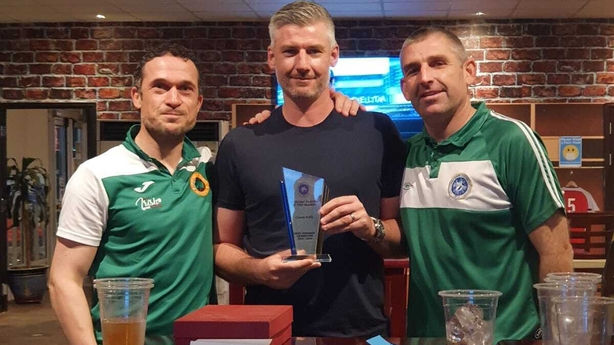
They also put out two club teams – Alba and Caledonia – originally set up by Scots that compete in league competitions.
Their league is currently on hiatus as the pitches are being used by World Cup squads but there were two locally organised 'World Cup’ tournaments, both won by Ghana – "they train five nights a week and don’t drink!".
The Irish do tend to like a drop of course. In Qatar, apart from in the World Cup’s temporary fan zones, alcohol is only legal for those over 21 in bars – all based in hotels – or at home, for foreigners, on a permit system.
The Shamrock Tavern, run by the second-generation Irish Garvey brothers, is a hotspot for football and GAA fans, and where Kelly watched Derry City’s FAI Cup triumph last weekend.
It is also the home of the Celtic supporters club – the Rangers fans frequent The Curry House instead.
"They [the Garveys] are Celtic and Birmingham City fans so that’s where we go to watch the Celtic games," says Kelly.
"I’d say at the last Rangers game there were probably 120 Celtic fans in there.
"They have the GAA, rugby and Ireland [soccer] games or League of Ireland on as well.
"That’s where all the Irish teachers would go at the weekend. You would think you were back in Ireland.
"It’s a good wee pub because Doha is all about five-star hotels and fancy bars. They do nice pub grub, a nice pint of Guinness and you can get to see the football in there as well."
Buying the official FIFA beer at an official FIFA fan festival in the official FIFA fan queuing system. Four pints per person, per serving at £12 each pint. Getting even a bit tipsy could be a logistical and financial challenge pic.twitter.com/BtTWVnOcsS
— Sam Wallace (@SamWallaceTel) November 16, 2022
The only beer available in the official fan zones - but no longer at the stadiums - is a 500ml serving of Budweiser, which will set you back a hefty 50 Qatari Riyals (€13.20).
That’s the same price as imported Guinness or Magners in the Shamrock but Kelly says that Heineken is also available for 35 Riyals (€9.35).
He has lots of friends and relatives coming to attend games and has tickets to quite a few himself, including England v Iran, the semi-finals and final, where he will be accompanied by wife Felice, from Belfast and a teacher at Doha British school, brother Gerard from Dubai, his daughters Amy and Caoimhe and son Fionn, also a footballer.
"You could actually go to three games in one day," he says, pointing out that the furthest stadium from downtown Doha (Al-Bayt) is just 40km away.
"But it’s not going to be as well attended as summer World Cups obviously, because Christmas is two weeks later and it is going to be expensive.
"It’s a pity we [Ireland] didn’t qualify. It would have been big excitement after living here for so long."
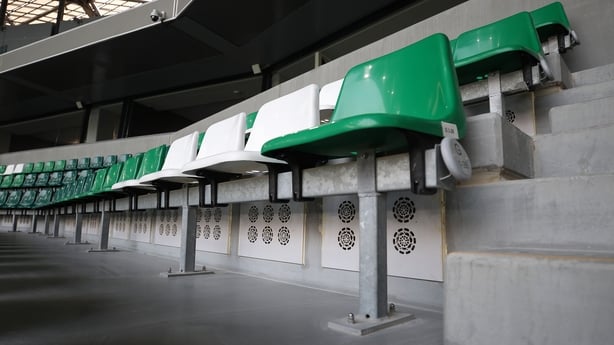
The reason the tournament has moved from the summer is that temperatures in Qatar then average 40c. Even now there will be aircon in the stadiums and the earliest any knock-out matches will start is 6pm local time (Irish +3 hours).
"There’s no doubt that you couldn’t play a World Cup here in the summer. In July and August you don’t spend any time outside.
"But it’s not so bad now, especially in the evenings. The temperature at night is perfect [high 20s]."
Kelly has been to exhibition games in the Khalifa stadium – such as Paris Saint-Germain against Real Madrid - and attended a couple of Qatari cup finals when Fionn was a mascot.
But he doesn't think football is a priority for most natives, who comprise just over 10% of the 3m population.
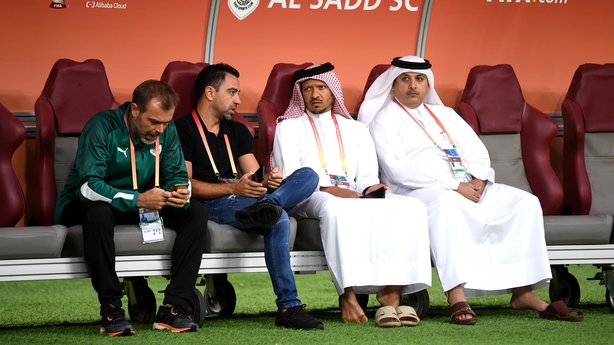
"There has never been a big football culture here. Any of the ex-pros, like Raul or Xavi, just came for money. A lot of these guys have played at a decent level and are coming here at the end of their career. Santi Cazorla [ex-Arsenal] is here at the moment.
"I think Xavi’s first game for Al Sadd there were 8,000 people at the match so there isn’t the same interest. Even from the ex-pats. It’s not like going to a Premier League match or a Celtic match.
"Some Qataris do [have an interest] but only a small percentage. I think they are getting more interested, but a lot of them will leave during the World Cup as well. The city is grinding to a halt a bit at the minute because they have pedestrianised a lot of the city centre.
"I hope it goes to plan. It’s going to be very difficult to pull off. Doha is a small place. It’s not a massive sprawling city. You’re trying to hold a World Cup with six stadiums in one place that isn’t even as big as Dublin.
"It’s going to be interesting to see how it pans out. Let’s see how the first game goes and we’ll get a fair idea. That’s the one that’s furthest out of the city."

Trevor McClelland – another Derry man and friend of Ronan’s – has been in Qatar for five years with wife Jen (a Manchester native) and daughters Grace and Éireann.
He organises a seven-a-side football match on Tuesdays, which takes place in the same park as training sessions for Oryx na hÉireann, Doha’s thriving GAA club.
"We play 6-7pm," he says. "The highest evening temperatures would be near 40c in the summer but it's the humidity level that gets you, some games are walking pace due to the heat."
McClelland was also in The Shamrock cheering on the Candystripes last Sunday and is a Liverpool fan, having attended their successful Club World Cup campaign here in 2019.
"There were probably 10-15 Derry fans but the bar was also packed with around 150 GAA players and family who had returned from winning a tournament in Dubai over the weekend, so the craic was 90."
Qatar follows a traditional Muslim Sunday-Thursday working week though – arranged around Friday prayers - and this, combined with the time difference, can make it difficult to meet for games, especially on Champions League nights.
"With the weekend here being on a Friday and Saturday I watch most games at home as they will either be late Saturday evening with work in the morning or on Sunday which is a working day.
"Dubai has recently changed to match the West (Saturday-Sunday weekend), I’m hoping Qatar follows suit soon!
"It will be a challenge during the World Cup but most [residents] are on reduced working hours or working from home over the course of the tournament to reduce traffic congestion."
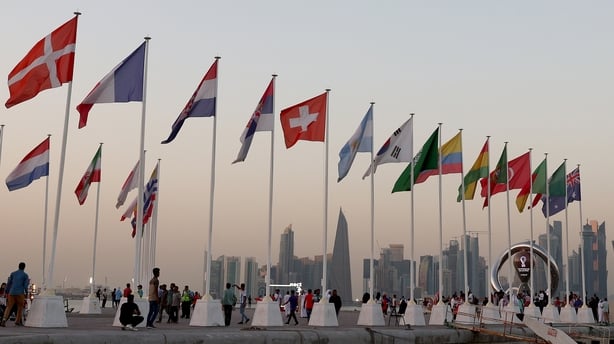
In contrast to Ronan, Trevor thinks the locals are "football mad and always have been".
He has tickets for six matches at the tournament.
"There is a real buzz [about the World Cup] aside from the negative press," he says.
"I would say the standard of the local league is comparable to the League of Ireland although the national team is actually quite good.
"They are Asian champions even though that is not well known on the world stage."
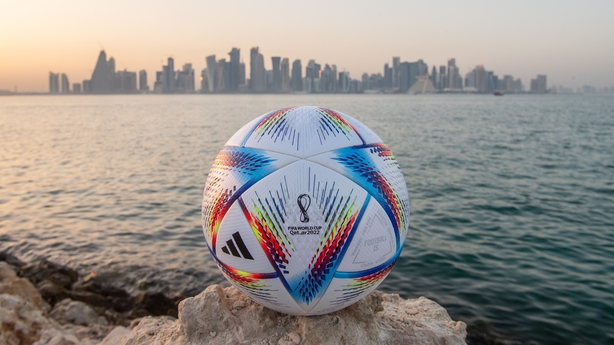
Expats in Qatar are understandably reluctant to speak frankly about the human rights issues in the country.
Gerry, from Dublin, says that there is often little direct interaction with Qatari natives but he thinks their mood could best be described as nervous anticipation.
"You don’t really mingle or have direct contact with Qataris here," he says. "They don’t work in normal day-to-day jobs, they’re in very senior jobs. So it’s hard to know but they seem to be looking forward to it and I think they’re well aware that there is big scrutiny on them.
"Foreign media is easily accessible and they are concerned about the negative media. The UK seems to have mounted a vigorous smear campaign that they are very aware of.
"I think policing will be quite hands off. There is a real push to convey a good account of the country for people coming over."
He feels that although there are still issues the international attention on scandals such as workers' rights means the World Cup has been a force for some positive change.
"There have always been issues here in terms of old draconian laws. With the 'kafalah' system you needed an NOC (No Objection Certificate) to change jobs. But if your company didn’t want you to leave, you couldn’t. Things like that take time to change but they are, slowly.
"They are making strides to improve. My personal view is that even though they are a developed country, they are still a very small one.
"There is definitely room for change but they are going in the right direction compared to other countries in the region."
Follow every game from the 2022 FIFA World Cup via live blogs on RTÉ.ie/sport and the RTÉ News app, or watch live on RTÉ Television and RTÉ Player, starting with Qatar v Ecuador on Sunday from 2.30pm








